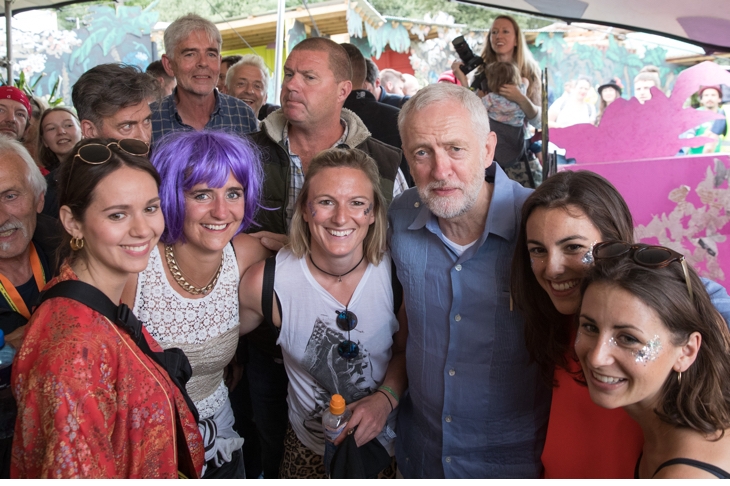Comparisons between Jesus and Jezza became commonplace long before he chose to end his election campaign with a rally at a church in Islington. As far back as August 2015, which in today’s political currency is at least two lifetimes ago, commentators were asking, ‘Is Jeremy Corbyn The New Messiah?’. It wasn’t just the shared initials (it’s a sign!) but the crowds he drew and the tearful adulation among his audience.
But Corbyn is not messiah-like – indeed his very lack of magnetism is part of his appeal. And neither does Corbynism fill some Christianity-shaped hole in British life. The old religion demanded confession, sacrifice and a commitment that extends beyond both the present and the self. Instead, Corbynism offers followers something more immediate than salvation: self-care. His appeal is not to lapsed church-goers so much as to those who practice yoga, meditation and mindfulness.
In the aftermath of the Grenfell fire, Corbyn was on the scene with hugs and tissues, expressing anger and promising to ‘speak up for all of you’. Corbyn ‘gave voice’ to the vulnerable and in response was hailed as ‘a true leader’. But this is not politics; it is therapy. Corbyn has become Britain’s counsellor. Despite the bluster about requisitioning empty properties, Labour set out no ambitious plans to fund and build badly needed new homes. Instead, Corbyn felt the pain of those affected and channelled the anger of the nation.
A therapeutic ethos underpinned Labour’s manifesto, proclaimed as radical for promises to scrap university tuition fees, bring mail, rail and power services back into public ownership and provide more free childcare. These proposals were not driven by aspiration and ambition so much as an impulse to protect, nurture and take care of our collective wellbeing. Under Corbyn’s Labour party, a National Education Service would provide ‘cradle to grave’ learning. We would all have a teacher helping guide us in the right direction, while looking out for our mental health.
Corbynism is not so much style over substance, but feelings over practicalities. Labour is for all things nice: ‘equality’, ‘fairness’, ‘bridges not walls’. Corbyn talks of justice, peace and most especially of ‘giving people hope’. T-shirts, posters and memes show his face emblazoned with the single word: ‘HOPE’. But there’s little sense of what exactly we are hoping for.
At Glastonbury last weekend, Corbyn again talked about hope: ‘Hope that it does not have to be like this. That inequities can be tackled. That austerity can be ended. That you can stand up to the elites and the cynics.’ The crowd, on cue, joined in the chorus with ‘Oh, Jeremy Corbyn!’ People I’ve spoken to who were there talk about this as as one of the most politically charged moments of their lives. Everyone mentions the crying, the joyous faces, the feeling of unity, the sense that anything might be possible.
Corbyn is, for now at least, providing meaning for people in search of a sense of purpose. It is what Christopher Lasch, writing in The Culture of Narcissism, describes as a ‘momentary illusion of personal wellbeing’. Politics as therapy makes those who already have nice lives feel psychically better about themselves. But it has little to say to people who want material not spiritual change: for those who want to own their own house, not just to squat in someone else’s; or those who aspire to set the course of their own life, not remain a perpetual student.
Those moments in the crowd feel good, but politics needs more than feelings. In November 1990 I turned 16 and The Farm released their hit song ‘All Together Now’. I celebrated by spending the weekend at a Militant Labour conference in Morecambe Bay. At the final night disco we belted out, ‘All together now, in socialism, together…’ High on cheap beer and even cheaper political arguments, I believed that revolution was imminent. It took a whole week before it dawned on me that feeling the ‘togetherness’ wasn’t enough.
Joanna Williams is education editor at spiked and author of Academic Freedom in an Age of Conformity: Confronting the Fear of Knowledge







Comments